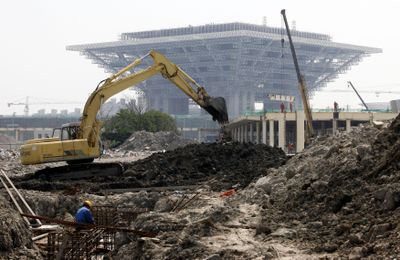U.S. stumbles in effort to build pavilion for expo
Chinese showing frustration as time for event draws near

WASHINGTON – The Web site for the Shanghai 2010 Expo displays picture after picture of gleaming national pavilions that are under construction in anticipation of the grand opening a year from now. Virtually every country in the world is participating in a six-month event that is expected to attract 70 million visitors at a site twice the size of Monaco, with the Chinese government spending $7.3 billion to demonstrate its new global standing.
But the Web page for the United States shows only an American flag and a notation, last updated in 2006: “U.S. Government has verbally expressed the official commitment of participation. The organizer is waiting for its written confirmation.”
Besides the United States, which missed a critical deadline last month to confirm its participation, the only other countries with diplomatic ties to China that remain uncommitted are Colombia and Andorra. The result is that the U.S. pavilion is in danger of not being built and the Obama administration has yet another diplomatic headache when it is trying to build ties with China and use “soft power” to extend American influence.
Xu Wei, spokesman for the Shanghai expo, said the United States is running out of time to finish its pavilion by year’s end, so expo organizers are preparing contingency plans. One option under consideration, according to reports from China, is to let KFC use the building for fast-food sales.
World’s fairs often result in architectural icons – such as the Eiffel Tower in Paris and the Space Needle in Seattle – and most other governments foot the bill for their national pavilions. But the United States since 1991 has relied on corporate funding and private donors, which meant it was a no-show or partial participant at most recent world’s fairs. The U.S. pavilion at the 2005 expo in Aichi, Japan, for instance, was largely underwritten by Toyota.
Though the problems with the $61 million pavilion project began in the Bush administration, senior Chinese officials have made clear their displeasure to Secretary of State Hillary Rodham Clinton, prompting the State Department to begin an intensive effort to rescue U.S. participation. Clinton has signed letters urging strong support for American participation to key organizations, such as the Committee of 100, a prominent group of Chinese Americans, and the American Chamber of Commerce in Shanghai. The proposed U.S. pavilion is a futuristic building featuring environmentally friendly technology, such as water-misting systems instead of air conditioning, a roof garden and wild bird habitat.
The Chinese made it clear they planned the Shanghai expo to be the largest and most extravagant in history. To lure U.S. participation, the Chinese government set aside a 60,000-square-foot site for the American pavilion, allowing it to anchor one end of the expo’s central promenade. To keep the U.S. project going despite one missed deadline after another, the Chinese construction company that would build the pavilion has advanced money to the architect in order to complete design and engineering work, sources involved in the project said.
While other countries rushed to announce their plans for participation, the U.S. effort lagged. The Bush administration insisted on a cumbersome process under which the State Department first selected the group designated to design, build and manage the project that group was then asked to raise the funds needed to construct it.
The team selected to build the U.S. pavilion, Shanghai Expo 2010 Inc., is a nonprofit partnership formed by Nick Winslow and Ellen Eliasoph, two former Warner Brothers executives.
Clinton focused on the problem when she received an earful from Chinese officials during her first trip overseas in February and became aware of the diplomatic consequences, U.S. officials said.
Eliasoph said that because of Clinton’s involvement, fundraising has begun to kick in.